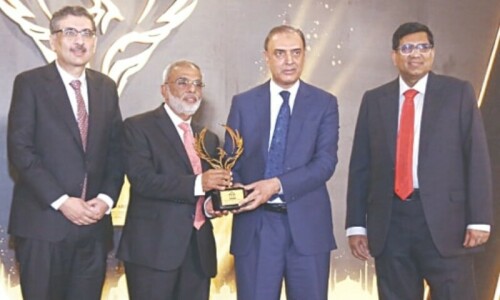What was disappointing about the performance of the economy in 2007-08 was not so much of its modest or low performance, as much as the vast gap between the very high target set and the reality.
As a result, instead of the growth target of 7.2 per cent, the GDP grew by only 5.8 per cent. This achievement is not too low compared to the last year’s high growth. What is more striking is that all the major targets have been missed. All that has led to inflation to build up to 11 per cent and the food inflation if calculated modestly, to rise up to 15 per cent. That was bound to happen as agriculture made the smallest contribution to growth-- 1.5 percent-- against the target of 4.8 per cent . This is too large a gap. The large wheat crop of 22.5 million tones proved to be rather an exaggeration, judging by the volatility of the market and the hardship of the poor.
The major crops recorded a negative growth of three per cent. Livestock, in view of the high price of meat saved the situation by recording a growth of 3.8 per cent . But that did nor benefit the poor who had to pay a very high price for the wheat flour. Wheat flour price shot to Rs30 a kilo but the small grower was not the beneficiary as he had sold the wheat at a low price. The real gainers by the high price were the big farmers with their large stocks, and the ruthless hoarders and stockists who exploited the situation..
The government has announced the withdrawal of sales tax on fertilisers. This step should have been taken earlier.
Shaukat Aziz as prime minister had glibly announced that if the Indian economy can achieve nine per cent growth, Pakistan can as well. And it can build the momentum year after year to reach 11 per cent as done by China. However, it was not possible to achieve high growth in agriculture or other sectors with frequent electricity breakdowns and regular load shedding. Apart from inadequate and irregular power supply, production has also suffered from high prices of fertilisers, pesticides and diesel.
Adequate protective measures should have been taken to shield agriculture from such external shocks , which were not taken.
In the livestock area, consistent high price calls for greater input by farmers for developing modern cattle and dairy farming. The World Bank has called for an end to food subsidy but it can only be phased out gradually.
Farm loans are not available to small growers, regularly and adequately . And that is one of the results of the tight monetary policy of the government to restrict bank loans. But the State Bank wants other banks to be liberal in granting farm loans to small farmers. This is an area where the government needs to focus. Of course, the overall credit flow to agriculture has picked up pretty fast in recent years.
Unless there is a radically new approach to agriculture, inclusive of land reforms, liberal loan facilities, and cheaper inputs, agri production cannot increase. And with a population of 160 million people increasing at two per cent annually, the country cannot depend on food imports. In fact, agriculture needs new attention and devotion to save it from the rut it has got into.















































Dear visitor, the comments section is undergoing an overhaul and will return soon.